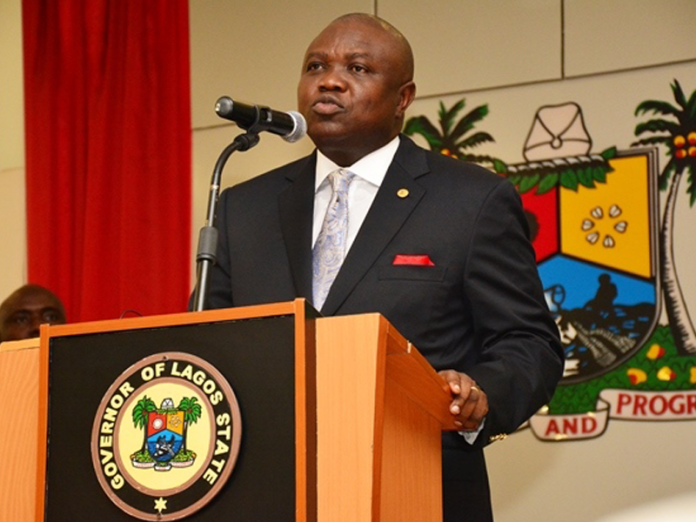- Ambode Proposes N1.04tn Budget for 2018 Fiscal Year
Lagos State Governor, Mr. Akinwunmi Ambode, on Monday presented an appropriation bill of N1.046 trillion to the state House of Assembly for the 2018 fiscal year, which he christened the budget of progress and development.
Ambode, who addressed a wide range of stakeholders made up of captains of industry, civil society actors, political and traditional leaders among others, disclosed that the budget represented an increase of 28.67 per cent compared to what he proposed under the 2017 fiscal year.
Although he put the state’s debt at N874.38 billion borrowed under different administrations in the last three decades, Ambode noted that it was inappropriate “to conclude that Lagos State has a high debt burden when situated within the context of infrastructure development and growth enjoyed presently by the state”.
He presented details of the state’s 2018 fiscal plan at the state House of Assembly, Alausa yesterday, assuring that when eventually approved, the budget would be used “to consolidate on infrastructure, education, transportation/traffic management, security and health.”
He added that his administration “will place emphasis on mandatory capacity building for civil servants, all teachers in public schools, officers in the health service sector and women and youth empowerment alongside our Medium and Small/Micro Size Entrepreneurs (MSMSE).”
Under the fiscal plan, the governor noted that N347.039 billion was allocated for recurrent expenditure and N699.082 billion for capital expenditure, thereby representing a ratio of 33 to 67 respectively.
To fund the budget, Ambode said a total revenue of N897.423 billion “will be generated under the fiscal year. N720.123billion “will be generated internally while a total of N148.699billion will be sourced through deficit financing within our medium term expenditure framework.”
He provided sectoral breakdown of the budget, allocating N473.866 billion for economic affairs; N171.62 billion for general public service; N126.3 billion for education; N92.67 billion for health; N46.61 billion for public order & safety; N54.58 billion for environmental protection; N59.9 billion for Housing & Community Amenities; , N12.5 billion for recreation, culture & religion, N12.5 billion and N8.042 billion for social protection.
Specifically, Ambode said the state government would maintain the tempo of continuous construction, rehabilitation, upgrading and maintenance of network of roads throughout the length and breadth of the state, including those within the boundaries of Lagos and Ogun States.
With the prevailing favourable weather condition, Ambode said 181 inner-city roads would be commenced, noting that contractors “will be mobilised immediately. We have made provisions for continuous gridlock resolution, junction improvement, construction of more lay-bys and advancement of signalisation that will improve traffic congestion especially along the Lekki-Epe corridor.”
He, also, listed the Agege Pen Cinema flyover, alternative routes through Oke-Ira in Eti-Osa to Epe-Lekki expressway, an eight-kilometre regional road to serve as alternative route to connect Victoria Garden City (VGC) with Freedom Road in Lekki Phase I, completion of the on-going reconstruction of Oshodi International Airport Road into a 10-lane road and the BRT Lane from Oshodi to Abule-Egba.
Under his administration, Ambode said the state government “has not contracted any new external loan to fund our projects since assumption of office. We have only completed transactions which were already in place before we assumed office.”
He explained that his administration inherited external loans from various past administrations which make up 60 per cent of all our loans, noting that the figure “is made up of some loans that have been running since 1989, about 30 years ago; and were contracted at an average of N80 to $US1.”
Sadly enough, the governor said the loans “are being repaid at an average rate of N305 to $US1 translating to 205 per cent increase in the loan repayment rate. The State has incurred huge exchange losses on its external loans in this year 2017.
“The exchange loss represent 35 per cent of the State external loans stock due to exchange rate slump of the Naira from N197.50 to $1 to N305 to $1. This is one of the side effects of an economy in recession.
“Irrespective of these losses, it will be inappropriate to say that Lagos State has a high debt burden when situated with the level of development and infrastructural growth enjoyed presently by the State. We are certain that the loans have continually been used for the wellbeing of all Lagos residents.
“Despite the additional burden arising from devaluation of the Naira, our debt service ratio remains very strong on the back of our impressive revenue performance. The state’s net debt stock of N874.38bn represents just about 3 per cent of the state GDP, while the Debt service charge to Revenue ratio stood at 15.61 per cent compared to 13.32 per cent in 2016 and 12.45 per cent in 2015. I am proud to report to you that, today, your state remains financially strong and the most vibrant economy in the Nigerian landscape.”



 Naira4 weeks ago
Naira4 weeks ago


 Naira3 weeks ago
Naira3 weeks ago


 News4 weeks ago
News4 weeks ago




 Naira4 weeks ago
Naira4 weeks ago
 Naira3 weeks ago
Naira3 weeks ago


 Jobs3 weeks ago
Jobs3 weeks ago


 Travel3 weeks ago
Travel3 weeks ago
 Naira3 weeks ago
Naira3 weeks ago




















